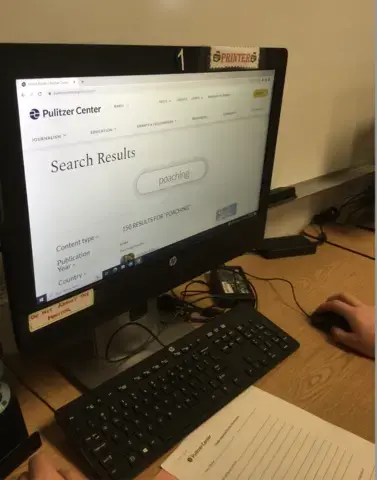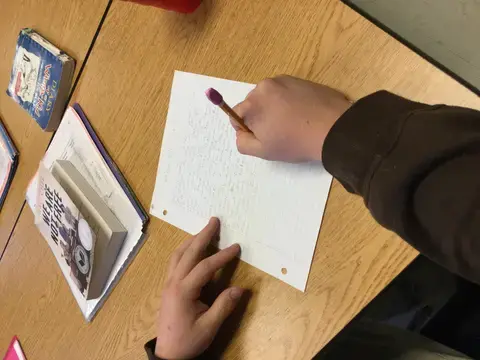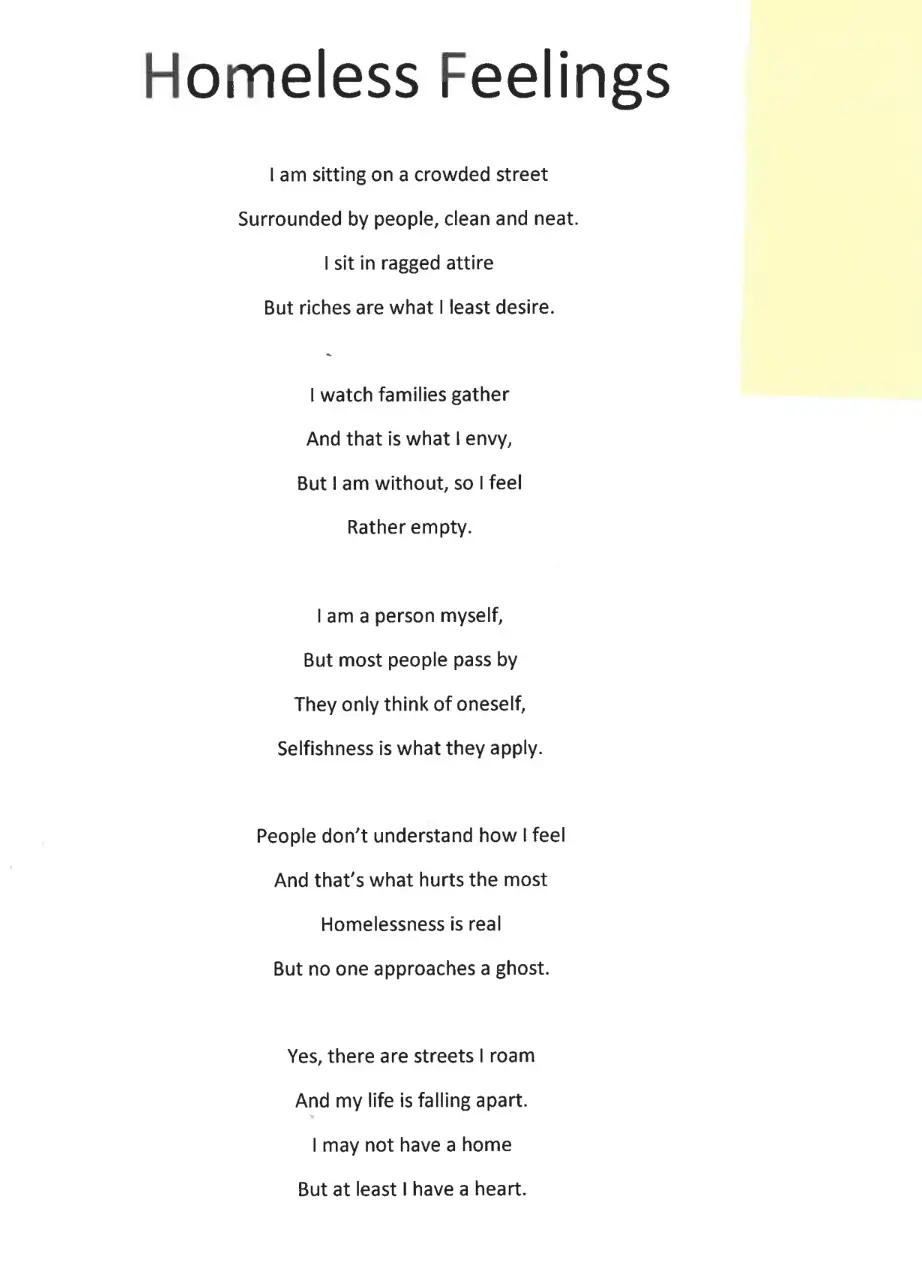This unit was created by Jessica Pastine, an English Language Arts and Social Studies teacher at the Kenneth “Honey” Rubenstein Center School for male offenders in Davis, West Virginia, as part of the 2022-2023 Pulitzer Center Teacher Fellowship program. It is designed for facilitation across nine 90-minute class periods.
For more units created by Pulitzer Center Teacher Fellows in this cohort, click here.
Objectives:
Students will be able to…
- Analyze news articles to determine if they represent an underreported news story
- Read, summarize and analyze news stories to determine the main idea and key details
- Analyze basic budgeting principles
- Evaluate the context of a variety of media images, both local and national, that capture stories of people and communities experiencing housing insecurity
- Write creatively about the topic of homelessness in the U.S. based upon what they learned from the news stories covered in the unit
Unit Overview:
Throughout this unit, students will examine underreported news stories about evictions and the housing crisis in the United States throughout the COVID-19 pandemic. Students will read, summarize, and analyze these news stories with a focus on how they exemplify inequality and injustice. The stories will provide a springboard for discussions about living wages and budgets, evictions/homelessness, the stereotypes associated with people who are without housing, and other social issues facing people experiencing poverty in the U.S. Students will also learn about the basic costs of living expenses in today’s world via an online simulation.
Students will engage in several projects throughout the unit. These include the creation of a class photo collage/slideshow of images that represent housing insecurity in West Virginia and/or the United States. Students will also be asked to complete creative writing activities about the photo collage. For example, they can create a poem, song, or short story inspired by the images they curated to capture their research on housing insecurity in West Virginia and/or the U.S.
Performance Task:
Students will complete a culminating project capturing their analyses throughout the unit about the root causes and lasting impacts of housing insecurity on communities in West Virginia and/or other regions in the United States. Students will view a short film about homelessness. They will then be given a creative writing assignment that requires them to synthesize their research into the stories of people experiencing housing insecurity in the U.S. into a creative work. Creative writing activities will include poems, songs, graphic novels, or short stories inspired by the film, as well as the context and themes of the news stories explored in the unit.
Assessment/Evaluation:
Formative assessment will be provided via direct teacher feedback.
Summative assessment will be evaluated using the One Paycheck Away: Final Assessment Rubric [.pdf] [.docx]
Nine-lesson unit plan for teachers, including pacing, texts and multimedia resources, guiding questions for group discussions, performance task instructions, and a grading rubric for the unit.
Unit Resources:
West Virginia College & Career Readiness Standards for English Language Arts:
9-12.4: Cite strong and thorough textual evidence to support analysis of what the information text says explicitly as well as inferences drawing from the informational text; recognizing, determining where, why, and when the text leaves matters uncertain.
9-12.5: Determine two or more central ideas of an informational text and analyze their development over the course of the informational text, including how they emerge and are shaped and refined by specific details; provide an objective summary of the informational text.
9-12.20: Write arguments to support claims in an analysis of substantive topics or text, using valid reasoning and relevant and sufficient evidence.
9-12.21: Write informative/explanatory texts to examine and convey complex ideas, concepts, and information clearly and accurately through the effective selection, organization, and analysis of content.
9-12.23: Produce clear and coherent writing in which the development, organization, and style are appropriate to task, pursue, and audience.
9-12.23: Develop and strengthen writing as needed by planning, revising, editing, rewriting, or typing a new approach, focusing on addressing what is most significant for a specific purpose and audience.
9-12.25: Use technology, including the internet, to produce, publish, and update individual or shared writing products, taking advantage of technology’s capacity to link to other information and to display information flexibly and dynamically, in response to ongoing feedback, including new arguments or information.
9-12.27: Gather and synthesize relevant information from multiple authoritative print and digital sources, using advanced searches effectively; assess the strengths and limitations of each source in terms of task, purpose, and audience; integrate information into the text selectively to maintain the flow of ideas, avoiding plagiarism and overreliance on any one source and following a standard format for citation.
9-12.30: Initiate and effectively participate in a range of collaborative discussions with diverse partners on grade level topics, text, and issues, building on others’ ideas and expressing ideas clearly and persuasively.
Overall, the unit was very successful and positively received by my students.... What surprised me most was the magnitude of personal experiences my students had with homelessness and financial security...I expected to have to work hard to build empathy for the homeless, but found that most of them possessed it in abundance.
Jessica Pastine, 2022-2023 Teacher Fellow, on her experience teaching this unit in spring 2023
The following examples of student work capture engagement by students in West Virginia who participated in the unit in spring 2023.
1. Students start the unit by exploring the term "underreported story" and analyzing how news stories they identify from the Pulitzer Center website reflect the questions asked by underreported stories:

2. Next, students focus in on analyzing underreported stories focused on the causes and lasting impacts of evictions in the United States. They start their analysis by exploring the Online Budgeting Game Spent and reflecting on what they learned by engaging with the game.
3. Students then engage in an analysis of several news articles and documentaries related to eviction in the U.S. and compose final projects reflecting local and personal connections to the resources they explored.

"I had decided since I was homeless, I didn't have anything to lose. That is why I did what I did to get locked up."
Student in Davis, west virginia who engaged with this unit in spring 2023

I know I have purpose, a purpose to live, a purpose to work, a purpose to be noticed, a purpose to change my path.
Student in Davis, west virginia who engaged with this unit in spring 2023

















